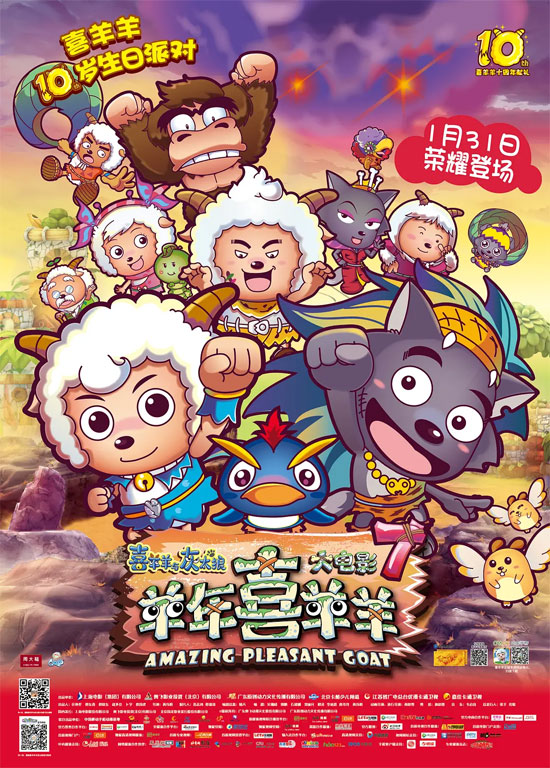Film Name: 喜羊羊与灰太狼之羊年喜羊羊 / Pleasant Goat and Big Big Wolf– Amazing Pleasant Goat

Perhaps with Wong Wai-ming back at the helm, the Pleasant Goat feature films have returned to a normal level of quality. However, for the Pleasant Goat brand, which has already begun its decline (with movie box office revenues falling year after year and TV animation viewership dropping due to reduced broadcasts), merely returning to normal is far from sufficient—it must deliver an extraordinary performance.
In fact, Happy Sheep 7 presented a prime opportunity for such exceptional performance—the identity-swapping blanket. While a common prop in American sci-fi films, this concept remains rare in Chinese animation. Chinese audiences—especially children—remain entirely unfamiliar with it, retaining a strong sense of novelty. Had the film focused intently on the identity-swapping premise, it would have been far more compelling than the predictable “Dragon Quest”-style narrative.
In the film, the identity-swapping rug only facilitates two exchanges: one between Grey Wolf and the frog, and another between Grey Wolf and Lazy Sheep. The former serves as an experimental demonstration of the rug’s function, while the latter advances the plot—yet unfortunately, the swap is reversed too easily. It’s fair to say the identity swaps in this film are insufficient in both quantity and complexity, with the deeper implications of the swap also underdeveloped.
Perhaps the filmmakers underestimated children’s intelligence, assuming more swaps would confuse them. Yet this overlooks how identity swaps can sustain children’s focus on the characters’ altered circumstances, drawing them deeper into the plot and encouraging them to grapple with the film’s “complex logic.” We should moderately raise the viewing challenge in films rather than settle for simplistic setups.
In fact, if Happy Sheep and Lazy Sheep swapped places, would it deepen their mutual understanding? If Red Sheep and Gray Sheep swapped, might it ignite more intense romantic chemistry between them? Taking it further, if Grey Wolf—already in Lazy Sheep’s body—were to swap places with another creature, their efforts to return to normal would become far more arduous. This would allow for a more intricate plot, making the viewing experience all the more delightful for audiences.
The concept of identity swapping is a brilliant idea, but it demands thorough exploration. Swapping identities is far more than merely exchanging bodies; it grants each person the opportunity to live within the other’s world. This allows them to see the world through the other’s eyes, think from the other’s perspective, and experience emotions and sensations previously inaccessible to them. If this depth isn’t conveyed, the so-called swap remains superficial. The most instructive example here is Hunan TV’s “Boonie Bears: The Big Shrink.”
The film centers on the friendship between Happy Sheep and Lazy Sheep, with Lazy Sheep’s misunderstandings posing the greatest obstacle. Wouldn’t it be more effective to have them swap places? Placing Lazy Sheep in Happy Sheep’s position—living under the spotlight—would allow him to truly grasp Happy Sheep’s hard work and struggles. Wouldn’t having Happy Sheep experience the dismissive glances Lazy Sheep often faces make him better understand why Lazy Sheep developed an inferiority complex? Such perspective-taking is difficult to achieve without role reversal.
Regarding the theme of friendship, when cracks appear in Pleasant Sheep and Lazy Sheep’s bond, the film simplistically and unilaterally assigns blame to Lazy Sheep. Pleasant Sheep, meanwhile, is portrayed as an almost flawless, idealized figure. This setup carries a hint of unfair treatment. After all, it takes two to tango. Great dramatic conflict arises when both arrogance and prejudice play their parts. When only prejudice exists without its counterpart arrogance, it diminishes not just narrative complexity but also the human charm and emotional resonance that emerge from mutual conflict.
For Pleasant Goat movies, the standard approach—like Detective Conan’s theatrical releases—of shifting settings and introducing one or two new characters per installment can no longer overcome audience fatigue. Each Conan film strives to present an ultimate challenge, whereas Pleasant Goat’s new scenes merely offer superficial location changes. To sustain this brand—at least its theatrical releases—or preserve its relevance for continuation, the screenwriting must employ unconventional, nuclear-level creativity to reignite market excitement.
Please specify:Anime Phone Cases » Pleasant Goat and Big Big Wolf– Amazing Pleasant Goat 2015 Animation Film Review: The original flavor is too bland.